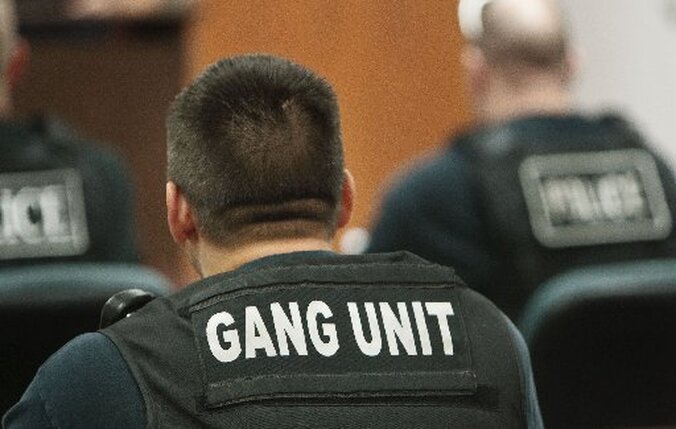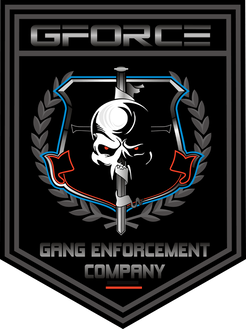|
Gang Enforcement is specialized work and calls for specialized individuals. Gang Enforcement Personnel must exhibit many good qualities and be mentally and physically competent.
Only serious individuals need to be associated with gang enforcement. The purpose of being a member of the gang unit is not to simply advance once "internal political" career or play dress up and wear cool looking gear. In fact, this is the last reason(s) for you to want to be in a gang unit. If this is what you want, there is no need to apply. While there are no absolute guidelines for selecting personnel for gang enforcement; strength and fitness is only one part of what makes up a good Gang Enforcement Professional. |
A few qualities you may want to look for are:
- Intelligence: For gang enforcement professionals, intelligence is an absolute must. Good skills in reasoning and being able to "think on your feet" are highly sought after traits. Selection of individuals with above average intelligence and from diverse educational backgrounds greatly enhances the versatility of the unit.
- Motivation: Self-motivation is a key part of a gang enforcement professional's success. Persons who enjoy a challenge and thrive on success make a good gang enforcement professional. Motivated individuals are greatly reliable.
- Stability: An even temperament is essential for a gang enforcement professional. Gang Units do not need someone who cannot keep their cool under high stress situations. Gang Officers are put in some of the most threatening, pressured, and stressed situations in the profession. No "one" officer is put in the position to be "targeted" by violence to include death like a gang enforcement professional.
- Physical Fitness: Gang Enforcement Professionals should be in good physical shape. This doesn't mean that everyone should be able to bench press 500 pounds or even be compared to the physical requirements of a SWAT or CERT officer but they have to have good strength characteristics. While upper body strength is part of this; stamina is an equal (if not more important) part of good physical fitness. Individuals should be in good shape. Also, gang enforcement professionals should be a non-smoker. The last thing a unit needs is someone who always needs to take a smoke break or worse can't provide the stamina due to trouble breathing. Physically, a gang enforcement professional should be able to run, hike, climb, and swim as a normal part of their daily physical training. The Gang Unit's physical requirements should be greater than basic academy training but not necessarily as rigid as the special response team.
Gang enforcement professionals will one day face a gang member that will have endured a much more rigorous and intense selection and training process than our own personnel. For this and several other reasons, the selection process and training standards of your Gang Enforcement Professionals must keep the highest of standards; clear from politics and social experimentation. The success of reducing gang violence will hinge on the cohesiveness and highly trained anti-gang and gang reduction element that has such standards in place.
Maintaining high standards during the selection process and training requirements will help ensure the success and safety of both the public at large and your gang enforcement personnel. Anything less, places the agency in a highly liable situation.
Furthermore, agency management who attempt to artificially create equality at all costs is also a liability and will destroy unit cohesion and effectiveness. Although having a diverse unit has its benefits; such as investigating gangs with racist ideologies, the staffing of a gang unit should never be about balancing the personnel numbers but instead recruiting and selecting the most qualified candidate to be entrusted with this duty. Being charged with going after the most violent of criminals is not a social experiment, not should it be treated as one.
Maintaining high standards during the selection process and training requirements will help ensure the success and safety of both the public at large and your gang enforcement personnel. Anything less, places the agency in a highly liable situation.
Furthermore, agency management who attempt to artificially create equality at all costs is also a liability and will destroy unit cohesion and effectiveness. Although having a diverse unit has its benefits; such as investigating gangs with racist ideologies, the staffing of a gang unit should never be about balancing the personnel numbers but instead recruiting and selecting the most qualified candidate to be entrusted with this duty. Being charged with going after the most violent of criminals is not a social experiment, not should it be treated as one.
Why become a Gang Enforcement Professional?
What motivates someone to become a Gang Enforcement Professional? First, it gives officers who want to "serve and protect" at a higher level a place to do so. These officers seek to take the most violent segment of our society off the streets ultimately saving our kids one child at a time.
Further, they want to serve with highly motivated individuals, who also seek a higher level of training and proficiency in their profession.
The desire to become a member of the Gang Unit must be matched by persistence and dedication to a team concept. The following is presented as a snapshot of just some of the criteria and methods that gang units use to select new gang enforcers.
*Criteria and selection methods differ from agency to agency and whether the agency has a full or part time unit.
What motivates someone to become a Gang Enforcement Professional? First, it gives officers who want to "serve and protect" at a higher level a place to do so. These officers seek to take the most violent segment of our society off the streets ultimately saving our kids one child at a time.
Further, they want to serve with highly motivated individuals, who also seek a higher level of training and proficiency in their profession.
The desire to become a member of the Gang Unit must be matched by persistence and dedication to a team concept. The following is presented as a snapshot of just some of the criteria and methods that gang units use to select new gang enforcers.
*Criteria and selection methods differ from agency to agency and whether the agency has a full or part time unit.
Gang Enforcement Unit Selection Standards
We seem to either not have a selection criteria or we attest to apply irrelevant social standards to our gang unit selection criteria.
Gang Enforcement Personnel should have a demonstrated history of the following:
The following is a basic guideline for some of the testing procedures and requirements which should be considered for staffing a gang unit.
We seem to either not have a selection criteria or we attest to apply irrelevant social standards to our gang unit selection criteria.
Gang Enforcement Personnel should have a demonstrated history of the following:
- High Integrity
- High Work Ethic
- Values Based Personality
- Leadership Skills
- Committed to Team Unity
The following is a basic guideline for some of the testing procedures and requirements which should be considered for staffing a gang unit.
- Written Exam: may consist of policies and procedures, computer skills, leadership skills, gang knowledge, and other pertinent skills necessary for the position.
- Fitness Test: When we examine the physical activities and demands of our profession, we find things such as lifting, dragging, pushing, dodging, sprinting, climbing, striking, and grappling, to name a few. A fitness program should focus on enhancing our ability to engage in these activities. In other words, we need job relevant and/or mission specific exercises. The training program and test must replicate the demand the job places on our bodies. Gang enforcement professionals need power, agility, speed strength, balance and endurance. Long duration, low-intensity activities such as extended distance runs, do not promote the first five qualities and develop a type of endurance that is actually counter-productive to our physical needs. A short distance foot chase, followed by a 1 to 2 minute struggle with the suspect to gain control requires explosive movement and a difference type of endurance: anaerobic endurance.
- Firearms Test: Gang units should require their officers to utilize firearms of various types with more proficiency and safety than front line officers. For this reason, the firearms test given to new unit candidates will normally be more comprehensive than anything encountered in either the basic academy or in regular qualifications training. The average firearms test should consist of but not be limited to: Target Acquisition Drills, Rapid Fire Sequences, Shooting on the Move, and Mechanical Knowledge of Weapon Operation.
- Review Board: Gang unit candidates should be required to pass an interview board, which is usually conducted to test the candidate's ability to think on their feet and gain insight into their suitability to the gang enforcement assignment. A great amount of information may be gained from a candidate including personality type, the amount of preparation they put into the testing, their ability to work as a part of a unit, and their level of commitment. Some interviews may also require the candidate make a presentation on a gang related topic as well as an in basket exercise where report writing and the decision making processes are measured. This is just another tool used to test candidates and is not conclusive as a testing procedure, but is used in conjunction with other methods.
- Psychological Evaluation: Gang unit candidates may be required to undergo psychological testing as part of the selection criteria or as a post selection process. Some units use this test during post selection limiting the evaluation to only those they are interested in. A few of the things that may be relevant are the candidate's ability to work with a unit, level of self confidence and ability to manage stress and pressure as well as develop a baseline for those officers who are more susceptible to manipulation and/or tolerance for breaking through ones integrity limits. In short and to be blunt, ensuring that a simple threat to ones safety and family does not cause them to cooperate with the very gangs they are charged with investigating. Some test procedures may be more strenuous and require higher scores to be picked for unit assignment.
- Other Selection Factors: Units may have pretesting requirements or post selection guidelines that a candidate may have to agree to. Failure to comply may lead to reassignment. Some of these guidelines may include but are not limited to; no smoking or tobacco use of any kind, no alcohol use, required response to call outs, minimum service required or at the extremes random polygraph test and financial audits.

